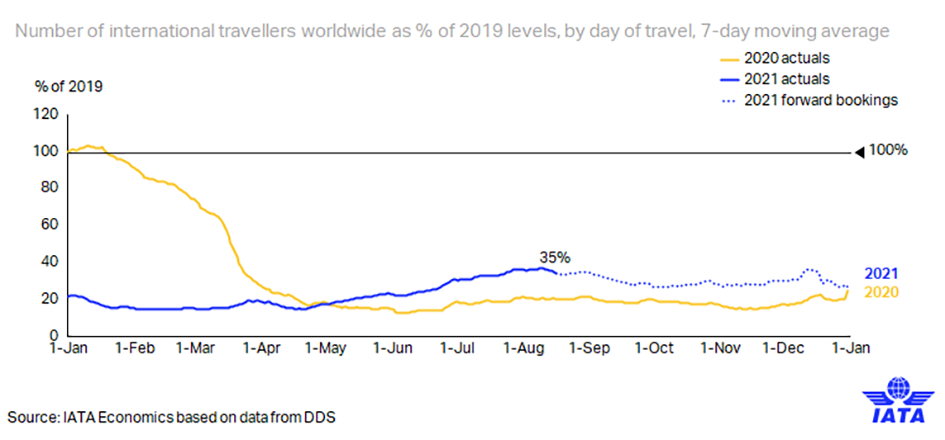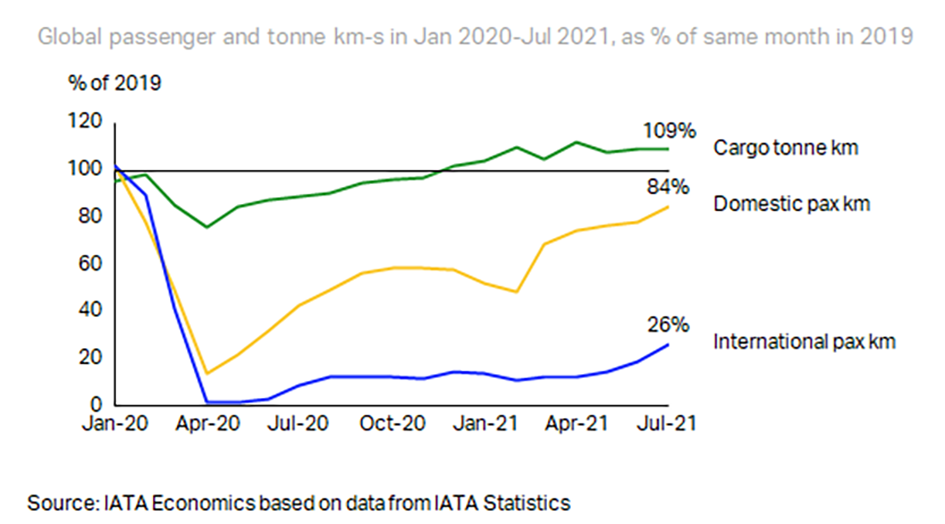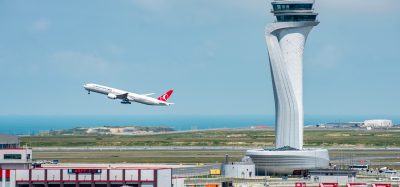The importance of the slot relief policy in aviation’s recovery
- Like
- Digg
- Del
- Tumblr
- VKontakte
- Buffer
- Love This
- Odnoklassniki
- Meneame
- Blogger
- Amazon
- Yahoo Mail
- Gmail
- AOL
- Newsvine
- HackerNews
- Evernote
- MySpace
- Mail.ru
- Viadeo
- Line
- Comments
- Yummly
- SMS
- Viber
- Telegram
- Subscribe
- Skype
- Facebook Messenger
- Kakao
- LiveJournal
- Yammer
- Edgar
- Fintel
- Mix
- Instapaper
- Copy Link
Posted: 13 October 2021 | Lara Maughan | No comments yet
Lara Maughan, IATA’s Head of Airport Slots, usually works to ensure airlines can get fair and non-discriminatory access to congested airports. But since the start of the crisis, her work has been focused on slot use waivers. Now, as the fourth season in a row requires slot relief, Lara explains why at 190 plus airports, globally, slot relief is essential regulatory support if aviation is to recover its globe-spanning route network as quickly as the removal of restrictions allows.


As the plummeting demand caused by the COVID-19 crisis in 2020 forced airlines to obliterate their schedules, it became immediately obvious normal slot use rules, requiring carriers to operate at least 80 per cent of their slots, were redundant. Globally, there was a general acceptance that ‘slot waivers’ should be granted, at first to flights operating to mainland China and Hong Kong SAR, and then within weeks for all flights at the 197 slot coordinated airports worldwide that serve 43 per cent of all passengers. What seemed incomprehensible a year ago was how protracted the recovery would be and the need for extended waivers season after season. But, while there remains no predictability or stability to global passenger demand, this relief is essential for the fourth season in a row to ensure flexibility and preserve international networks.
On one hand it would seem completely logical that these strict usage rules should be removed while the industry deals with its worst crisis, but the reality is it has been a long and difficult round of advocacy every time another season has approached. Why? There are many reasons, some related to pre-COVID-19 pandemic views on granting access to congested airports, others to overly optimistic forecasts for recovery.
Slot waivers were a rare phenomenon before 2020. They were previously granted in response to huge industry shock events to allow some respite for one season at the most.”
It was unheard of to have two full seasons of global waivers at every airport, let alone four seasons of some kind of slot relief. Yet, it is also a fact that aviation has never seen a crisis of the size and depth of this COVID-19 pandemic. With states imposing restrictions daily, even as they ‘reopen’, and international traffic still hampered by varying and complex rules, airlines have no choice but to request extended slot relief. Relief provides the flexibility, the normal process that prevents heavily congested airports. It is also a vital measure if we want to restore the size and shape of the global air transport network, that in 2019 supported $700 billion of global GDP as quickly as possible.
Why slot waivers have been so vital
Preserving slots means protecting international routes that rely on precise slot times, ensuring they are still there to build the recovery on. Without this blueprint for recovery, aviation, and the benefits it provides, could be set back decades, costing airlines and airports dearly as they must again compete to rebuild the original routes in which they both invested. With the entire value chain decimated, it makes no sense to ask for this sort of investment again. There is also no doubt it would mean some routes lost prematurely, before they are even given chance to recover, as airlines would be pushed to operate to the most valuable destinations.
Airlines need months of stability to anticipate the shape and size of their post-COVID-19 networks. Demand needs to re-establish in markets that are open to travel – right now there is simply no active market for many long-haul routes.
If forced to make decisions prematurely to operate schedules with insufficient demand or lose the slots, there will be airports that see swathes of airlines departing for good and connectivity will be jeopardised.”
For some it will mean the status quo is preserved because, luckily for them, airlines will know they cannot survive without the slots they hold at that particular hub. But, ensuring only the biggest hub airports recover quickly does not best serve the industry or the public. Regional services need the lifeline of existing operators strategically positioned to connect to larger hubs to ensure their survival too.
There is a lot of talk of long-term structural changes in the market and consumer behaviour, but it is too early for this to be assessed. Having spent hours discussing with airline schedule and network planning teams, there is no denying that recovery will occur quickest if supported by a flexible and reasonable slot policy. Never has their job been so reactive, dynamic, and many would say, quite exciting because of the freedom to test and revise the network quickly. Without the normal constraints of congestion management, airlines have been able to plough capacity into the routes most in demand while travel remains ‘local’. But they also know these will not be the frequencies that will be sustained even next summer (2022). Other airlines have been able to use ad hoc slots to gain access at airports that could become permanent features of their network, given the priority inbuilt in the slot relief measures for these operators in future seasons. What is important is the ability to react to changing restrictions, health measures and where passengers want to travel and book at the last minute. This is driving much needed cash flow into the whole aviation ecosystem and rebuilding confidence in travel.


Figure 2: International demand showed some improvement in the peak northern summer, but forward bookings appear to stagnate
The flexibility to prevent the phenomenon of ‘ghost’ flights and the wasteful emissions they create, is an obvious and welcome side-effect of slot relief. But, there is also another benefit that is going to come into its own in the next phase of recovery. IATA has sounded warning bells, as have many others like ACI Europe, that the ability to serve a fast ramp-up in demand will be significantly hampered by processing times running into hours rather than minutes because of passenger COVID-19 documentation checks mandated by governments. Airports are equally suffering from extensive queuing and new demands on their capacity, but slot relief is a fair, non-discriminatory way for airports to reduce their normal available capacity to cope with this burden in a tactical way. Without slot relief there are going to be winners and losers based on who is granted access, not due to demand or their planned schedule, but because the infrastructure cannot cope with the health management measures governments mandate.
The unanticipated benefit – global slot policy cooperation
In ‘normal’ circumstances there are differing views on slot policy, which could have disabled the Worldwide Airport Slot Board (WASB). Something I am hugely proud of is the way the three stakeholders of the WASB – ACI World members, Worldwide Airport Coordinators Group members and airlines – were able to make a common solution for relaxing slot use rules their top priority. The recommendation from the WASB for slot relief has paved a way for regulators to move forward from the full waivers they have adopted. It is proving effective this summer season and will be in place at more than 30 airports this winter in countries such as the UK, Singapore, New Zealand, Dubai, and Turkey. Seeing airports and airlines find a common understanding of their needs during the crisis, encourages me that despite different views on some aspects, we can continue at the WASB with many other policy matters and find agreeable outcomes, not just COVID-19 related. The outcomes will always be a compromise, the consensus of a global board representing every region. But importantly, if adopted globally and consistently, these challenging compromises stand to lead the future of slot policy development not because of single interests, but because it represents a unified majority voice. So, if something good comes of the crisis in our strange world of slot coordination, it will be the will of the WASB to work together when congestion becomes an issue again.


Related topics
Aeronautical revenue, Air traffic control/management (ATC/ATM), Airport crisis management, COVID-19, Passenger experience and seamless travel, Passenger volumes, Regulation and Legislation, Terminal operations
Related organisations
International Air Transport Association (IATA), Worldwide Airport Slot Board (WASB)



















